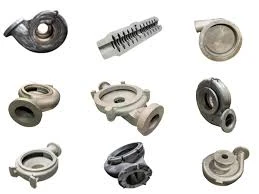Mobile:+86-311-808-126-83
Email:info@ydcastings.com
die casting alloy
Die casting is a popular manufacturing process used to produce complex metal parts with high precision and efficiency. One of the key elements in die casting is the alloy used, as it directly impacts the quality, strength, and durability of the finished products. Die casting alloys are specially designed to withstand the rigorous conditions of the casting process while delivering superior mechanical properties.
The most commonly used alloys in die casting are aluminum, zinc, and magnesium alloys. Each of these materials has unique characteristics that make them suitable for different applications. Aluminum die casting alloys are known for their lightweight, corrosion resistance, and excellent thermal and electrical conductivity. They are widely used in the automotive, aerospace, and consumer electronics industries, where strength-to-weight ratio is crucial.
Zinc die casting alloys, on the other hand, are favored for their excellent fluidity, enabling the production of intricate shapes with thin walls. They also exhibit high impact strength and resistance to wear, making them ideal for components that are subject to frequent handling and stress. Zinc alloys are commonly used in the manufacturing of hardware, automotive parts, and decorative items.
die casting alloy

Magnesium die casting alloys are the lightest among these materials, offering exceptional strength and stiffness
. Despite being less commonly used than aluminum and zinc, magnesium alloys are becoming increasingly popular in industries that prioritize weight reduction, such as automotive and aerospace applications. They also provide good thermal conductivity and vibration damping properties, making them suitable for high-performance applications.The selection of the appropriate die casting alloy is critical for ensuring optimal performance and cost-efficiency of the final product. Factors such as the intended application, environmental conditions, and specific mechanical requirements guide manufacturers in choosing the right alloy. Additionally, advancements in alloy technology continue to enhance the performance capabilities of die casting materials, enabling the production of lighter, stronger, and more durable components.
In conclusion, die casting alloys play a fundamental role in the manufacturing process, offering a wide range of benefits that cater to various industries. Aluminum, zinc, and magnesium alloys each provide unique properties that can be leveraged for specific applications. As technology continues to evolve, we can expect even more innovative die casting alloys that push the boundaries of what's possible in manufacturing, meeting the ever-growing demands for efficient and high-performance components.
-
Understanding Metal Casting TechniquesNewsApr.02,2025
-
Understanding Exhaust Manifolds for Enhanced Engine PerformanceNewsApr.02,2025
-
The World of Metal FabricationNewsApr.02,2025
-
Key Components for Pump and Turbo EfficiencyNewsApr.02,2025
-
Essential Tools for Automotive Maintenance and RepairNewsApr.02,2025
-
Durable Valve Components for Effective Water ManagementNewsApr.02,2025











